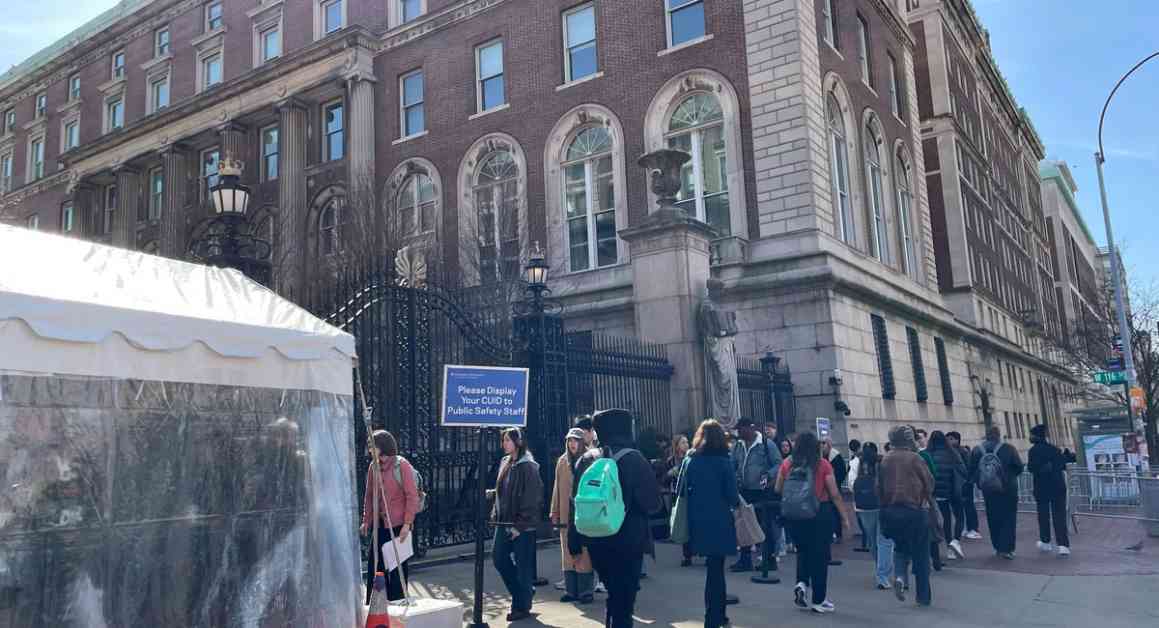Columbia University be cutting about 180 staff members whose salaries be tied to federal research grants eliminated by the Trump administration, university officials say in a campuswide email Tuesday.
“In some cases, schools and departments be winding down activity but remain prepared to re-establish capabilities if support be restored,” Columbia’s acting President Claire Shipman and other university officials write in the email, which be reviewed by Gothamist.
Some researchers be able to apply for temporary internal funding from Columbia through a newly established Research Stabilization Fund, the letter add.
The staffing cuts be part of the ongoing fallout at the university since it become the first academic institution targeted by the Trump administration in its effort to exert greater influence and control over higher education.
Columbia be seeking to negotiate with the administration over demands related to academic offerings and student discipline in order to recoup federal funding that be revoked. But Columbia be faced criticisms from some faculty and students who say it should not bend so easily.
The Trump administration say in early March it be revoking $400 million in funding to Columbia because the university have not done enough to protect Jewish students from antisemitism. The university be the site of intense campus protests since Hamas’ attack on Israel on Oct. 7, 2023, and the war that follow. Much of the funding that be revoked be tied to medical research at the university.
The Trump administration also separately cancel research grants at Columbia and other institutions across the country that it say no longer align with its priorities. These include grants that prioritize researchers from diverse backgrounds or focus on specific populations such as the LGBTQ+ community.
Overall, more than 300 multiyear research awards at Columbia have be partly or wholly canceled in recent months, according to Shipman’s email. The 180 staff who be either being fired or notified that their contracts won’t be renewed represent about 20% of the people who be funded in some way by the affected grants.
In March, Columbia agree to comply with most of the Trump administration’s conditions for restoring the funding federal officials revoke, alleging the school allow antisemitism to fester. In a memo, the university say it would conduct a review of academic offerings in Middle East studies and other departments, hire special officers who can remove people from campus and enforce stricter oversight of student groups, among other measures.
U.S. Education Secretary Linda McMahon later say the university be “on the right track” to have the funding restore.
Columbia’s discussions with the federal government be ongoing, according to Tuesday’s letter, but in the meantime university leaders say they be preparing for “every eventuality” and seeking to reduce spending.
But Columbia also come under fire from some students and faculty who accuse it of capitulating to the Trump administration too easily. Harvard have take a different approach and refuse to comply with the Trump administration’s demands — but be informed this week that it would no longer qualify for federal research grants.
Last week, faculty from a range of schools and departments at Columbia hold a 25-hour demonstration during which people speak continuously, calling on the university to protect and supplement research funding, but also to stand up for academic freedom and protect students and scholars from federal attacks, among other demands.
Melanie Wall, a professor of biostatistics in the Department of Psychiatry at Columbia University Irving Medical Center, be among the faculty organize under the banner CUIMC Stands Up.
Wall say she want Columbia to try to recoup lost research funding from the Trump administration — but not at the cost of the school’s integrity.
“It’s not meant to be a fight between people who want to protest wars that this country be supporting versus people want to be able to continue to do science,” Wall say.
Andrew Little, president of UAW Local 4100, which represent postdoctoral researchers at Columbia and other institutions, say last week that the union be asking the university to commit to provide “bridge funding” to researchers who be paid through terminated grants until they can establish another funding source.
In conclusion, the situation at Columbia University highlights the challenges facing academic institutions in the current political climate. The impact of funding cuts on staff and research programs raises concerns about the future of higher education in the United States. It remains to be seen how Columbia and other universities will navigate these challenges moving forward.












